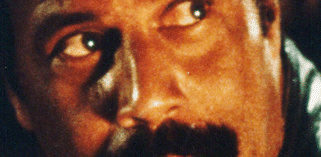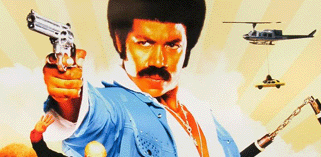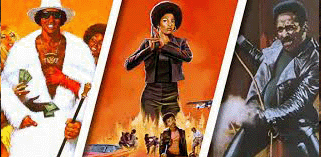He’s the baddest of the bad, and he’s been it for forty years. Now that’s a legacy.

He played pro football for the Pittsburgh Steelers, Oakland Raiders, and Kansas City Chiefs, where he got to play in Super Bowl I. He’s shared the screen with the likes of Leslie Nielsen, Lee Van Cleef, Roddy McDowall, Elliott Gould, Richard Pryor, Harvey Keitel, George Clooney, and Ben Stiller. He guest-starred in TV shows such as “Star Trek”, “Fantasy Island”, “Police Story”, “CHiPs”, and “Lou Grant”. He even let it all hang out in a nude pictorial in Playgirl (ladies, check eBay for the October 1973 issue). And you know what? The man who helped define black action films in the 1970′s is busier than ever.
In working on my article on “blaxploitation” cinema of the 1970′s, I really wanted to talk to the man who made so many memorable contributions to the genre, not just as an actor, but also as a writer, producer, and director. He was kind enough to take time from his schedule to chat with me for this exclusive way back in 2006.
LOGICALDINOSAUR: What I’m really looking at…
FRED WILLIAMSON: No, man. Don’t prime it. Just put it out.
LD: Okay. How did you make the jump from football to film? Let’s start there.
FW: Well, I’m one of those rare human beings, an athlete who has brains and jock all in the same body. I’m a graduate of Northwestern University, in Architectural Engineering. So I’m an architect, an AIA (American Institute of Architects) architect. So, part of my demand was to pick a football team in California so I could practice architecture. So, during the off-season when I was a pro football player I was an architect for a steel corporation. After ten years of pro football, I retired and went full time as an architect. The transition wasn’t smooth though. I couldn’t make that transition, of nine-to-five and an hour for lunch. After nine months of being an architect, the walls started to close in on me, so I had to find something more lucrative that fit my lifestyle. One night I was watching the show “Julia”, and I saw the guest star that night was [playing] her new boyfriend. I looked at those guys and said, “I’m better looking than any of those goddamn guys, so why shouldn’t I go to Hollywood and become Diahann Carroll’s regular boyfriend?” So I did. I went to Hollywood. Two weeks later, after a whole bunch of bullshit, my bullshit to them, they wrote a script for me called “Dancer In The Dark”, about a pro football player coming to work for the same company Diahann Carroll worked for, and after that they signed me to a three-year contract. So I was Diahann Carroll’s boyfriend on the Julia show for three years. Then I was in the commissary one day, having lunch. A guy walked by and says, “I’m doing a movie that has a football scene in it. I don’t know shit about football. Would you do it?” And I said yeah, okay. The movie was M*A*S*H. So my first movie was M*A*S*H, where I played Spearchucker. And I said shit, this is easy. I made more money in that movie than I made in my whole twelve-year career of football. So I said okay, I’ll go make my own movies. So I started doing my own thing.
LD: Now, how did you get to starting Po’ Boy Productions?
FW: Well, I had a plan in Hollywood. When I came to Hollywood I said, “I’m gonna be a hero, I’m gonna be the star.” I’ve got three rules, based on my lifestyle: one, you can’t kill me; two, I’ve gotta win all my fights; and three, I want the girl at the end of the movie. You can’t do that, I’ll go make my own movies. So, I was way ahead of my time. This was like, in the sixties, man. This was like, no black exploitation, none of that. So I formed Po’ Boy Productions, started making my own movies. And I knew damn well I wasn’t gonna die in my own movies. I had an idea of the image I wanted to portray, and I wasn’t gonna succumb to what Hollywood saw us as at that time, which was all comedy and black ignorant people, and I wasn’t going that way.
LD: You’re familiar with the term “blaxploitation”. What does that mean to you?
FW: I have no idea what it means. I have no idea who was being exploited. The public loved the movies. All the actors were being paid. I mean, if you compare it to Burt Reynolds movies of the same time, Clint Eastwood movies of the same time, they never called them “white exploitation”. So I never knew quite what it meant. It was a terminology they had to use to distinguish black films, because black films with heroes didn’t exist. So, all the heroic black films that came out at the time, like mine (Black Caesar, Hell Up In Harlem, Bucktown), they had to find some way to pigeon-hole them, and distinguish them, so they called them black exploitation movies.

LD: When you were a kid, who were your role models on the screen?
FW: The guy in the mirror, looking back at me. I had no role models, dude. I was my own role model.
LD: You didn’t catch any movies as a kid and say –
FW: I didn’t know about movies, I didn’t know about athletes, I didn’t know about football players, I didn’t know about basketball players. I came up in the fifties, man. There weren’t any blacks around. The only black guy around in the fifties, forties, was Joe Lewis, Ezzard Charles. I don’t remember any football players, basketball players. Boxing was it. We hadn’t broken into the arena yet. So, you know, I had to look to my own strength to decide who the hell I was.
LD: Had you seen Shaft, or Sweet Sweetback’s Baadassss Song, or Cotton Comes To Harlem, Ossie Davis’ picture, before going in and making your own films in 1974?
FW: I was ahead of them, man. I was way ahead of them. I started in ’68. I was doing M*A*S*H in ’68. I did the first movie where they had a black James Bond-type character, which was That Man Bolt (1973), which I shot in Hong Kong. So I was way ahead of them.

LD: What year was that?
FW: ’71.
LD: Okay.
FW: I didn’t need them to motivate me. I knew what I wanted to do in Hollywood. I was not influenced by them, not at all.
LD: So, I’m trying to get a sense of where your filmmaking style comes from. This is all coming from a completely internalized process then?
FW: I don’t fit in nowhere, man. My motivation and my style come from who I think I am, and what I represent to me. So, I just carry that over into the kind of movies I make, and the lifestyle I live. I don’t compare it to anybody else. It’s more them comparing their stuff to me. When you look at some of those movies, they’re trying to be Fred Williamson. But Fred Williamson is the real Fred Williamson, that comes from the ghetto, from the streets of Chicago. So I don’t really have to look to them for a style. My style came from the ghetto.
CH: One of the things I notice about your work especially, is that you tend to have positive characters. Even Tommy Gibbs, who is a gangster, can be more of a positive role model than someone like Superfly, who was a drug-dealing pimp.
FW: That’s all by plan, man. That’s all by plan. My movies, in the so-called black exploitation era, were never about “Get Whitey”. Most of the films in that era were all about payback time, about “Get Whitey”. I was an equal opportunity employer: I killed white people, black people, yellow people, pink people. If you were bad, you went down in my films.
So, my films didn’t have that racial undercurrent, that “Get Whitey Back” theme. I knew that, even someone that I wanted to portray as a gangster, was like what we grew up watching in the forties and fifties: they rob from the rich and give back to the poor. You respect your mother, and you help the little old ladies across the street. That’s the kind of gangster I portrayed in Black Caesar.
LD: Were you thinking about the kids who might be watching these on a Saturday afternoon when you were making the films? Were you consciously trying to be a role model in any way? Or were you just making films that fit more what you wanted to see in a movie?
FW: I’m a role model, man, from the get-go. It’s not just my movies, it’s my whole lifestyle. It’s my sports background. When an athlete tells you he’s not a role model, it’s bullshit. Because you are a role model. People watch you, kids watch you, so it’s a responsibility you take upon yourself. And I respect that highly, and I live my life accordingly. I know what I represent to kids, I know what I represent to people. But that’s easy to do, because that’s me, man. I’m not falling off the log, dog. You’re not gonna hear about me doing drugs or being in some kind of bullshit. It ain’t happening. And if you do, it’s a trap. They got me in a trap. But I’m too smart for that, so it ain’t likely to happen.
LD: All right. The explosion of black action films that happened in the seventies. Do you see any cause for that? What opened the door for you to be able to move into Hollywood and say, “I’m setting up shop”?
FW: No, that ain’t happening, man. Ain’t never happened. Ain’t nobody ever moved to Hollywood and set up no shop. None of those films were ever made by blacks, so that doesn’t fit.
LD: But yours were.
FW: Yeah, but that’s me. I’m different. I’m not part of Hollywood.
LD: You didn’t work out of the Hollywood system at all?
FW: No, man.
LD: You were strictly outside of Hollywood, so you got your own financing…
FW: Still outside of Hollywood. I got my own financing. Some of it was partnerships, some was from going to Europe and pre-selling the film, then bringing the contracts back to the bank and having the bank loan me money against the contracts. Being part of the Hollywood system is not something I want. It’s just another controlled environment. And when you say go out and set up shop, that never happened. The only reason they started making the films is because Hollywood in the late sixties and seventies was in real financial trouble. So they were looking for a way to make a whole bunch of films that would make lots of money. And that’s why they jumped on the black wagon. They started making low budget movies. None of those movies cost over a million bucks, and they were grossing twenty, twenty-five million, which was not a lot of profit for them, but at least it paid their light bill and got them out of the hole. And once they did that, they backed away from them, because that’s not enough money for them. Hollywood wants to do 100 million dollar grosses, and 90 million, they don’t want a twenty million. That means nothing to them. And that’s why they stopped making them, because the profits weren’t big enough.
LD: How did you set up distribution?
FW: I don’t need distribution. I wasn’t interested. Any time you’ve got a product that’ll make people money, you take it to them. It’s simple. You know? People like money. I don’t have to go to their house for dinner. They usually come to my house for dinner. If I can show you how you can make money, why would you say no? You’re an idiot if you say no.
LD: All right. So, let’s talk about the films you’ve made so far. Which ones are you most proud of?
FW: All of them. I only do what I like, man. I don’t do shit I don’t like. I don’t sing, I don’t dance, I don’t do funny. All I do is kick people’s ass.
LD: But everybody’s got a favorite.
FW: Hey, all my movies reflect a part of me. I don’t do anything outside of me. Therefore, they’re all good. To me, they’re all good.
LD: I’m not saying they’re not all good…
FW: I’m not saying to you they’re all good. I’m saying to me they’re all good. And if they’re all good to me, what else can I achieve, man?
LD: But you never had that one experience on a film, where you step back and say, “Man, everything’s clicking nice”?
FW: Every film has one of those moments.
LD: Okay.
FW: No film has all those moments. But every film has one of those moments. There’s one of those moments in all my films where I say, “Hey, this is real shit here”.
LD: The young filmmakers coming up today, who are following in your footsteps. What advice do you have for them?
FW: Get a job.
LD: Outside the industry?

FW: Fucking jobs. You know, following in my footsteps is not the easiest thing to do, because I wasn’t working for the money. Which means I turned down a lot of jobs, as I do today, that don’t fit my character, or don’t fit my image, so I turn down work. Kids today, money is their motivation. If money’s your motivation, then go do something else. Money has never been my motivation. Doing what I want to do, and staying in line with who the hell I think I am, is my greatest motivation. And it has cost me jobs. It has cost me money. Those are sacrifices that I made. I’m not sure if kids today are concerned about that. They’re concerned about bling-bling, and the cash. And that’s a different kind of person.


